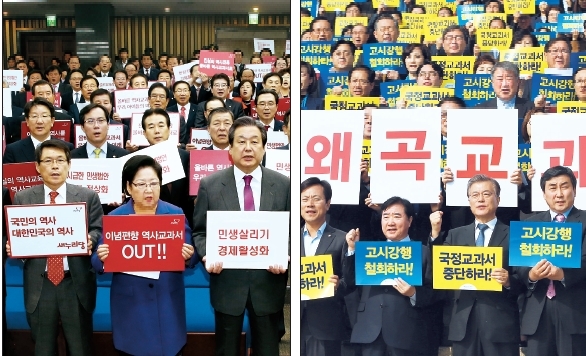Prime Minister Hwang Kyo-ahn announced Tuesday that South Korea would officially reinstate government-issued history textbooks for secondary education from 2017, saying that the current system had failed after four years of implementation.
“It is realistically impossible to author a correct history textbook under the current system. It is the government’s conclusion that the privately-authored system has failed,” Hwang said during a joint press conference with Education Minister Hwang Woo-yea at the Seoul Government Complex. “We need to make a textbook based on objective facts, and true to constitutional values.”
He said that current history circles were dominated by left-leaning scholars, and private publication could only create textbooks that were favorable to the leftists and North Korea.
The decision added fuel to the widespread protests nationwide led by the progressives, students, teachers and scholars, who have denounced the government decision as being unilateral with some suggesting it was politically motivated to glorify the past dictatorships.
 |
| Lawmakers of the main opposition New Politics Alliance for Democracy (right photo) hold a rally in front of the National Assembly urging the government to withdraw its state textbook plan, while members of the ruling Saenuri Party (left photo) show their support for the plan on Tuesday. (Yonhap) |
The main opposition New Politics Alliance for Democracy boycotted the plenary session of the National Assembly to protest the government’s decision.
NPAD chief Rep. Moon Jae-in said the government “trampled the dominant public sentiment” against the state textbooks. “Ignoring the majority and pushing ahead with an illegal system, isn’t that dictatorship?” he said
But Rep. Kim Moo-sung, chief of the ruling Saenuri Party, bashed the NPAD for boycotting the session and said, “Dragging the textbook issue into a political standoff while people’s livelihoods are at stake is just not right.”
Korea currently allows eight private publishers to author textbooks, and authorizes them for use. The system was implemented for Korea’s modern history lessons in 2002, and expanded to encompass the entire secondary history education system in 2011.
Despite giving the go-ahead to the current textbooks in the screening process, the government in 2014 said they were too biased to use.
The move came after President Park Geun-hye emphasized the importance of “correct history education” on a number of occasions.
Hwang said that the nationwide rejection of a history textbook by Kyohak Publishing ― which was disputed for allegedly being of poor quality and overly favoring the conservatives ― showed just how lopsided the current history education system is.
“After a series of threats and pressure from ‘certain parties’ on some 20 schools that chose the Kyohak book, only three schools are now using it. The remaining 99.9 percent use textbooks that are supposedly biased,” said the prime minister.
Hwang said that the current textbooks have only a minimal description of North Korea’s torpedo attack on South Korean corvette Cheonan, “as if to back absurd claims that the ship was sunk by the U.S., or by rocks.”
He also pointed out that teachers’ guides recommend to tell students that the Korean War was an “ideological war sparked by internal conflict of the Korean people.”
“There are even questions that ask what juche ideology (Pyongyang’s official governing philosophy) is,” he said.
Even though all textbooks say that juche is used to justify the North’s dictatorship, Vice Education Minister Lee Young said that the books devote five or six lines to describe the ideology and only about six words on its negative aspects. “Students will be affected by the portion that is described in length. I’m sure this is what most people will think,” he said.
Last week’s poll by Gallup Korea showed that 36 percent of the respondents support the state textbooks while 49 percent opposed it.
The ministry on Tuesday also posted the reviews of the public opinion on the issue it had gathered for the past 20 days, which showed that 152,805 people submitted written petition for the policy while 321,075 petitioned against it in paper. Additional 131,384 petitioned online against the policy. But the number showed huge disparity from the figure claimed by the NPAD, which said that over 1 million people handed in their signatures in protest of the policy.
The ministry said the current system limits the ministry’s capacity to right the errors in textbooks, because of “rampant lawsuits by authors challenging the government order to revise the content.” The authors of six history textbooks are currently locked in a legal battle with the ministry over the content, and the case is still pending at the Supreme Court.
Education Minister Hwang Woo-yea added that he would ensure that the new textbooks will be free from errors and bias, and said consultants from various fields will supervise the books. He said the ministry may display parts of the textbook online to receive feedback from the general public during the publication process.
In addition to addressing the supposed bias, the new textbooks will place more emphasis on Korea’s ancient history, which is expected to downsize the section dealing with modern history in the textbook. In light of the textbook spat, there had been calls from the conservative media to reduce the portion of modern history that has is at the center of ideological dispute.
Minister Hwang’s emphasis on ancient history also indicates that the new books will impose the government’s position on some disputed parts of Korea’s history. While stressing the necessity for “a unified voice,” Saenuri has pointed out that countries like China ― which has attempted to claim the ancient Korean kingdom of Goguryeo as its own ― allows government to actively organize its ancient history.
The minister also said the entire process would be transparent, although the ministry said it will respect the authors’ wish to remain anonymous for “obvious reasons,” referring to outside pressure.
The specifics of the state textbooks will be unveiled at Wednesday’s briefing by the National Institution of Korean History, which will oversee its publication process.
By Yoon Min-sik
(minsikyoon@heraldcorp.com)



